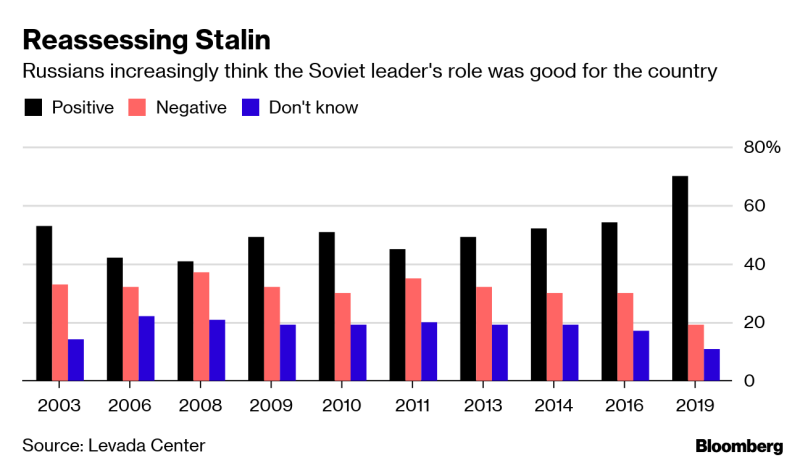
Soviet — specifically Stalinist — nostalgia is alive and well in Russia, according to a new poll conducted by the Moscow-based Levada Center, The Moscow Times reports:
Bloomberg adds that the poll found that the nationwide perception of Joseph Stalin, the former leader of the Soviet Union, is becoming more and more positive among Russians. Levada, the country’s only independent polling center, which Quartz described as a “crucial member of Russian civil society,” conducts a survey about Stalin annually. The 2019 results showed that 51 percent of Russians view Stalin with admiration — up from 40 percent last year and the highest mark since the survey began in 2001. Even more strikingly, 70 percent said Stalin’s 31-year rule was good for the country.
“Adoration of Stalin at an all time high in Russia, 70% of people regard his role as positive,” tweeted Leonid Ragozin@leonidragozin. “Stockholm syndrome passed from generation to generation. It’s ironic that Stalin was a semi-taboo figure for half of Soviet history.”
The findings reflect an “irrational romanticization of the Soviet past and of the figure of Stalin” expressed not only by older people but also by those aged under 25 who didn’t live in the communist era, said Levada’s Karina Pipia.
“Stalin begins to be perceived as a symbol of justice and an alternative to the current government, deemed unfair, cruel and not caring about people,” Academy of Sciences sociologist Leonty Byzov was quoted as saying by RBC. “It’s purely a mythological image of Stalin, very far from the real historical figure,” he added.
Vladimir Putin’s own nostalgia for the Soviet Union appears unlimited, and he is now resurrecting perhaps its most notorious feature: the purge. Recalling the Stalin era, the recent arrests and imprisonment of numerous regime figures have fueled a pervasive sense of fear among the country’s elites, writes Andrei Kolesnikov, a senior fellow and the chair of the Russian Domestic Politics and Political Institutions Program at the Carnegie Moscow Center:
 Putin prefers to have new technocrats in ministerial and gubernatorial positions. They are loyal officials aged between 40 and 50, preferably unconnected to any local elites, driven to meet their targets, and with no ambition to tackle political issues. These newcomers are already scared by the continuing purges, and will not undertake anything without the leadership’s approval. That will put any genuine modernization in Russia on hold – just as Putin intends.
Putin prefers to have new technocrats in ministerial and gubernatorial positions. They are loyal officials aged between 40 and 50, preferably unconnected to any local elites, driven to meet their targets, and with no ambition to tackle political issues. These newcomers are already scared by the continuing purges, and will not undertake anything without the leadership’s approval. That will put any genuine modernization in Russia on hold – just as Putin intends.
Political Imprisonment in Russia: Motives, Tools, and Trends
Conservative estimates suggest that there are about 250 political prisoners in Russia today, the Wilson Center adds. These prisoners—which include human rights activists, journalists, representatives of religious groups, and many others—have fallen victim to Russia’s vague and highly flexible criminal code. Sergey Davidis, head of the political prisoners support program at the Memorial Human Rights Center, will offer his assessment of this situation and an outlook for the future.
Speaker
 Sergey Davidis, Head of the Political Prisoners Support Program and Member of the Council, Memorial Human Rights Center.
Sergey Davidis, Head of the Political Prisoners Support Program and Member of the Council, Memorial Human Rights Center.
Tuesday, April 23, 2019
3:00pm-4:00pm
5th Floor Conference Room
Wilson Center
Ronald Reagan Building and
International Trade Center
One Woodrow Wilson Plaza
1300 Pennsylvania, Ave., NW
Washington, D.C. 20004
Phone: 202.691.4000







